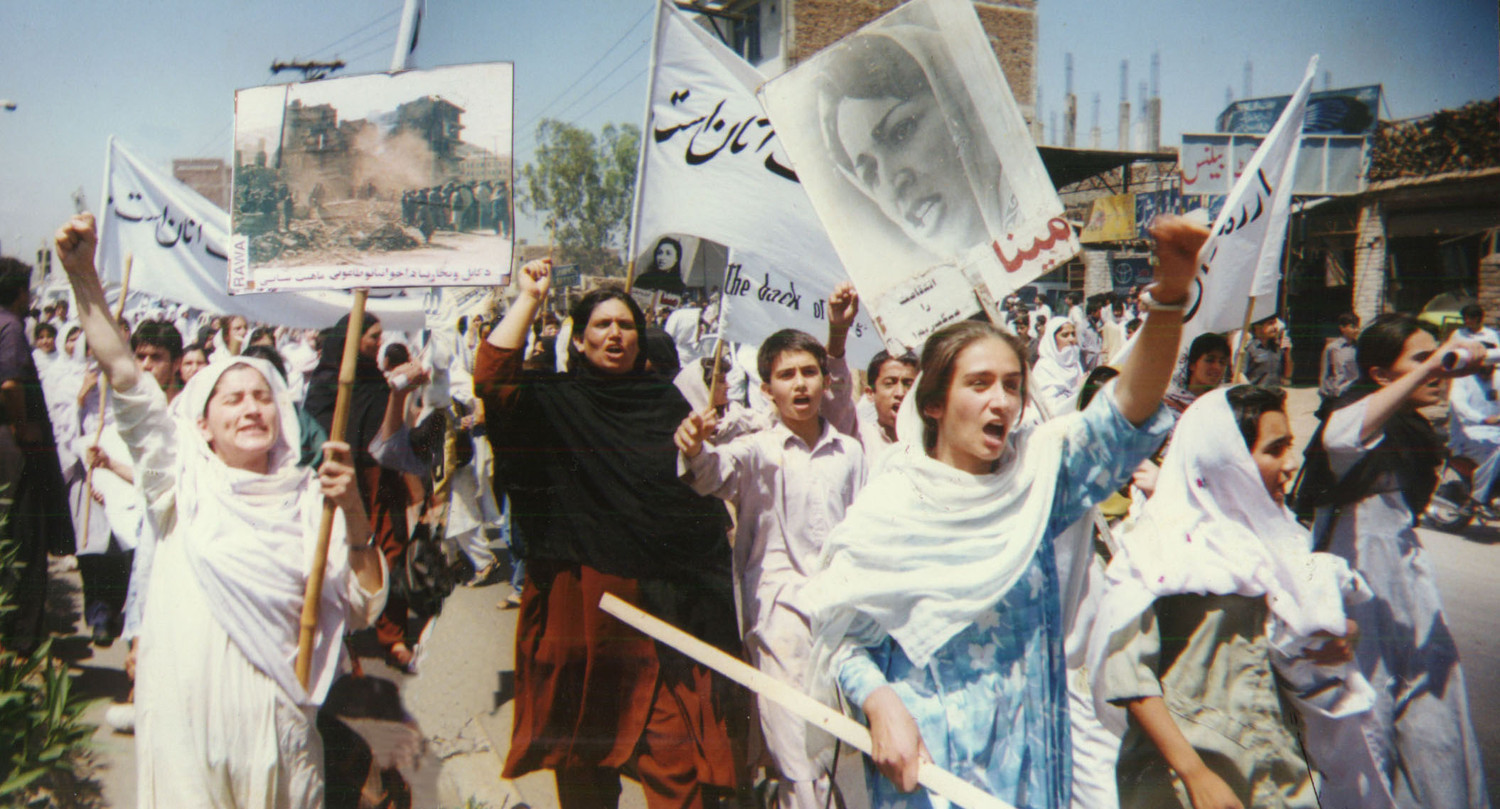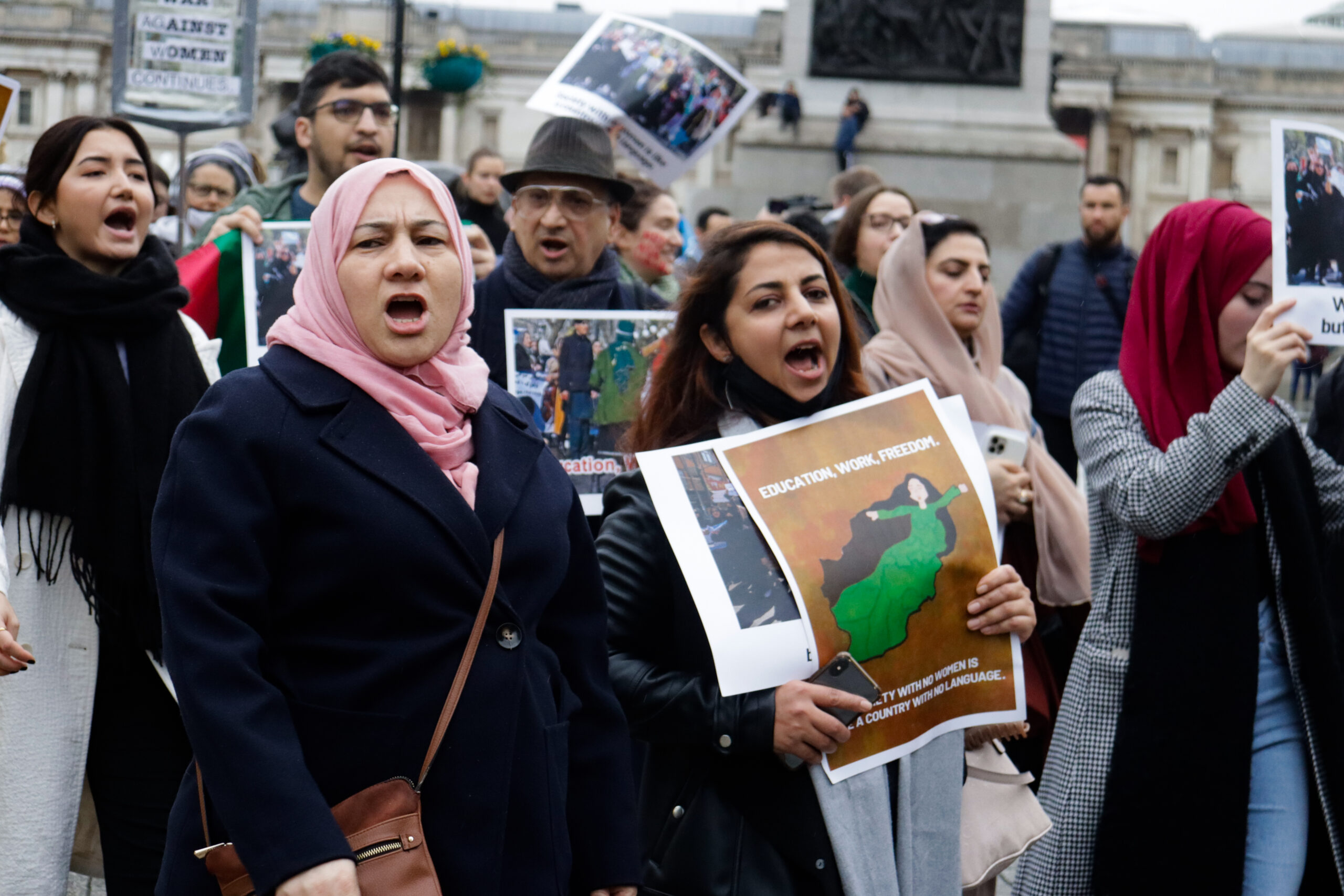
In late 2022, Tamana Zaryab Paryani, an Afghan woman in exile, initiated a hunger strike, demanding that the international community formally recognize gender apartheid as a crime against humanity . This act of defiance embodies the ongoing struggle against the Taliban’s regime that systematically erases women from public life. Her actions, alongside other protests in national and diasporic spaces, continue a legacy of resistance that Afghan women began in the ’90s during the Taliban’s first regime. This transcends mere opposition to physical and political oppression; it’s also a profound form of epistemic resistance, which includes challenging dominant forms of knowledge and producing counter-knowledge to assert their own perspectives.
Despite their hypervisibility in 2001—when the U.S. invasion of Afghanistan was justified as a mission to “liberate” Afghan women, these same women’s narratives were ignored during 2019 U.S.-Taliban peace negotiations, and further marginalized under the Taliban’s regime since 2021. Historically, gender rights have been used as symbolic markers of progress in imperial “modernizing” projects, while Afghan women’s voices have often been co-opted to align with broader geopolitical interests. Thus, Afghan women’s lack of epistemic authority—their exclusion from producing and controlling the knowledge about their own situation—remains one of the most glaring injustices. Yet, even under the Taliban’s oppressive regime, Afghan women continue to reclaim their authority through diverse forms of defiance and by creating alternative frameworks to the imperial desire of war-making, namely the call to codify gender apartheid as a crime against humanity under international law.
Addressing the systemic nature of “gender apartheid” demands a comprehensive response that confronts the imperial legacies, inequalities of power, and militarization that sustain this oppression. This post calls for a radical rethinking of advocacy and legal frameworks, one that holds the Taliban and the international powers accountable for the structural forces that continue to shape and impact Afghan women’s lives. It invites rigorous academic inquiry to understand how the term can practically address the root causes of Afghan women’s repression. Without such critical analysis, we risk repeating the cycle of reductive engagement that has consistently failed Afghan women.
The Legacy of “Empowerment” and the Rise of Gender Apartheid: A New Legal Framework
The “success” of “women’s empowerment” in Afghanistan has often been reduced to superficial metrics, serving as symbols of progress within a neoliberal agenda. Feminist scholars like Lila Abu-Lughod critique such approaches, arguing that western discourses frequently impose a monolithic imperialist framework of “modernity” on non-western women, neglecting their complex socio-political and cultural histories. This framing obscures Afghan women’s agency by reducing their struggles to checkbox exercises under the guise of inclusivity.
With the Taliban’s oppressive policies, including the recent Law on the Promotion of Virtue and the Prevention of Vice, banning Afghan women’s voices in public, the widespread violations of Afghan women’s rights have reached a critical juncture. Thus, the term “gender apartheid” has regained traction in national and diasporic circles.
The ‘success’ of ‘women’s empowerment’ in Afghanistan has often been reduced to superficial metrics, serving as symbols of progress within a neoliberal agenda
Modeled after the concept of racial apartheid, the naming of which was crucial in dismantling institutionalized racial oppression in South Africa, “gender apartheid” offers a powerful legal framework for addressing the systemic oppression of individuals based on their gender identities. While existing legal mechanisms like the Rome Statute offer a framework to prosecute gender persecution, its application is often slow and underutilized. Gender apartheid, instead, captures the structural and continuous nature of gendered discrimination—not as isolated acts of persecution but as an organized system that meets the legal threshold of apartheid.
The call to codify gender apartheid has gained significant support from UN experts, international organizations, and recently, the European Parliament, highlighting historical progress in pushing for legal recognition over imperialistic war-making. Theoretically, codifying gender apartheid would trigger a stronger obligation on states, providing them with specific legal tools to fulfill their international commitments on gender discrimination. It would demand greater accountability from the international community, which has defaulted to a policy of inaction in Afghanistan, even as the Taliban regime erodes human rights, particularly those of women.
The notion of apartheid carries a symbolic and political weight, as seen in its application to racial apartheid in South Africa. Apartheid is recognized as a jus cogens norm—a fundamental principle of international law that is non-derogatory. By codifying gender apartheid, the international community could invoke a powerful form of “shame” politics, forcing states to respond to the ongoing violations. States like Iran, Russia, Pakistan, China, and others that have maintained relationships with the Taliban would face increased pressure to align their foreign policies with human rights standards so as not to be seen as complicit with an apartheid regime. This means that recognizing gender apartheid has the potential to create a global social movement that could isolate regimes like the Taliban, preventing the normalization of systematic gender oppression.
Critical Considerations on Codifying Gender Apartheid
While gender apartheid’s recognition offers a transformative framework for addressing systemic oppression, its practical implications warrant careful consideration. Thus, the enthusiasm surrounding this term should be tempered with a critical perspective on its potential limitations:
Gender Apartheid as a “Celebrity Term”
The codification of gender apartheid carries the risk of being reduced to a symbolic gesture within international legal and humanitarian discourse. Feminist scholars critique the commodification of women’s struggles within neoliberal frameworks of development. Here, concepts like “empowerment” and “gender equality” have often been depoliticized and co-opted for imperialist agendas, particularly within the context of the “saving Muslim women” discourse. Historically, this narrative has been used to frame military and political actions as benevolent efforts to liberate women. However, this framing often reinforces colonial attitudes and Orientalist representation of Muslim women.
In this context, the term “gender apartheid” risks becoming yet another “celebrity term”—a label loosely used to attract attention and political capital without addressing the entrenched structural forces perpetuating Afghan women’s oppression. This dynamic reflects the broader feminist critique of projectization, where women’s struggles are repackaged as consumable narratives and development projects for international visibility, serving neoliberal interests while remaining detached from the lived experiences of those they are intended to help.
Instead of bluntly defining Afghan women’s current conditions in yet another colonial term, the movement advocating for gender apartheid’s codification (the movement) must interrogate how the language and frameworks surrounding this term may perpetuate the very power dynamics they seek to challenge. It’s vital to clearly articulate their demands and expected outcomes of this process, ensuring that this concept is grounded in the realities of Afghan women within the country. Its use must also be accompanied by a long-term commitment to addressing the structural conditions of Afghan women’s oppression.
Practical and Legal Challenges of Enforcement
Codifying gender apartheid may face resistance from states unwilling to expand the scope of international human rights law, preventing any addition to their international responsibilities. Practically, gender apartheid’s codification is a long effort with no specific timeframe, due to the normative heavy lifting that it requires. Accordingly, the UN Special Rapporteur on Afghanistan suggests continuing to hold the international community and the Taliban accountable for their responsibilities via any available legal avenues, calling it an “all tools” approach.
Even if gender apartheid is successfully codified in a timely manner, its enforcement presents significant legal and practical challenges. Among others, the ICC, as the institution responsible for adjudicating cases of gender apartheid, has been critiqued for its limited reach and efficacy. Legal scholars have pointed out that the ICC’s focus on prosecuting individuals, rather than addressing systemic violence, limits its ability for structural change.

Considering that the politics of shame is a critical aspect of the crime of apartheid, it’s essential to assess what additional “shaming” could achieve in the context of the already isolated Taliban regime. Historically, shaming has been a double-edged sword; while it can sometimes catalyze change by highlighting human rights abuses, it can also deepen the ideologies of those in power. The Taliban’s claims of legitimacy through their interpretation of “Islamic traditions”—though viewed as a façade to maintain control—can reinforce their narratives and possibly bolster support. Consequently, increased external pressure may not lead to the meaningful reforms expected, but instead compel the Taliban to double down on their positions, using condemnation as a rallying point to further entrench these ideologies among their “followers.” This dynamic illustrates the complexity of shaming as a strategy, raising critical questions about its practical effectiveness in confronting a regime that can leverage its ideological stance to resist change.
These challenges are compounded by the limitations of international legal mechanisms in addressing the structural conditions giving rise to gender oppression. In the case of gender apartheid, for a meaningful impact to occur, the legal structure and its enforcement need to move beyond symbolic prosecutions and meaningfully address the broader systems of inequality that sustain gender-based oppression. One possible solution is for the movement to focus its advocacy on a more comprehensive effort, thus making clear that international legal efforts should be complemented by policies that address the root causes of gender apartheid, including imperialism, capitalism, economic inequality, militarization, and patriarchal norms.
The Instrumentalization of Gender Apartheid in International Law
The codification of gender apartheid may become instrumentalized within the international legal order. As international law is not a neutral tool but one deeply embedded in historical power relations that can reinforce existing hierarchies, this would raise concerns about the use of international law for purposes other than justice. This critique is central to feminist concerns about how international legal interventions often serve geopolitical interests rather than addressing the root causes of gender oppression.
Legal scholars have critiqued how international law is often instrumentalized by powerful states to advance their own political and economic interests, rather than achieving justice for marginalized groups. They argue that international legal frameworks, including those aimed at protecting women’s rights, are frequently co-opted by hegemonic powers to legitimize military interventions, economic sanctions, or political pressure, often under the guise of humanitarianism. Without careful safeguards, the legal recognition of gender apartheid could be used to selectively exert political pressure aligned with the goals of powerful nations, while overlooking other instances of systemic gender oppression. As seen in international responses to human rights abuses in countries like Saudi Arabia or Iran, there is often inconsistency in how violations of women’s rights are addressed, depending on the strategic value of the state in question.
In the case of gender apartheid, for a meaningful impact to occur, the legal structure and its enforcement need to move beyond symbolic prosecutions and meaningfully address the broader systems of inequality that sustain gender-based oppression.
To avoid such instrumentalizations, it’s crucial to ensure that international legal efforts are grounded in solidarity with Afghan women. This means actively involving diverse groups of Afghan women in the drafting, interpretation, and implementation of legal instruments related to gender apartheid. Furthermore, building coalitions with feminist and resistance movements can help create a more effective front that resists the co-optation of women’s rights for political ends. The analysis of patriarchal systems must engage with transnational and postcolonial feminist frameworks, which highlight how imperialism not only shapes geopolitical landscapes but also perpetuates gender hierarchies. Transnational solidarities should focus on challenging patriarchal structures and the imperialist systems that sustain them, ensuring that legal interventions serve the interests of justice rather than geopolitical strategies. Establishing accountability mechanisms that monitor the application of international law can prevent its misuse, promoting transparency in its enforcement.
A New Era for Afghan Women’s Struggle
The struggles of Afghan women and their diasporic comrades should move beyond mere advocacy for codifying gender apartheid as a crime and encompass a more comprehensive critique that highlights the continuous role of imperial powers in perpetuating Afghanistan’s crisis despite the existence of numerous international legal principles and commitments.
While the Afghan women’s movement has drawn western attention to codifying gender apartheid, this often leads to symbolic collaboration without fundamentally altering geopolitical strategies, like enabling political upheavals for broader strategic interests. Thus, the movement must interrogate the discourse around gender apartheid and clarify its demands and expected outcomes, challenging superficial allyships that ignore deeper geopolitical complexities.
Transnational solidarities should focus on challenging patriarchal structures and the imperialist systems that sustain them, ensuring that legal interventions serve the interests of justice rather than geopolitical strategies.
If the call for codifying gender apartheid leads to further isolation of the Taliban’s regime, ending the international aid, or imposing broad-based sanctions, one must critically assess the impacts on women’s lives inside Afghanistan. Such consequences are likely to exacerbate their suffering under extreme Taliban oppression on a daily basis. Historically, in most cases of isolation and broad-based sanctions, such as with Iran, regimes often survive while the people continue to suffer. The South African regime, often cited as an inspiration, is more of an exception than the rule. While international sanctions were a vital factor in dismantling apartheid, this success was due to a unique confluence of factors. South Africa’s economy was highly integrated into global trade systems, making it particularly vulnerable to sanctions, unlike regimes like the Taliban, which have less dependency on international markets.
Moreover, South Africa’s internal resistance movement, including robust labor unions and grassroots activism, played a pivotal role in sustaining pressure from within, something that many isolated regimes do not experience to the same degree. Additionally, the apartheid regime lacked the same level of strategic regional and international support that the Taliban command. Thus, the Taliban are often insulated from the effects of sanctions, allowing them to persist while the populations suffer the brunt of economic hardships. Therefore, the movement must deeply engage with the historical and geopolitical nuances and consider whether such strategies align with their goals. To move beyond the current status quo, there is a need to foster collaborative spaces with Afghan women, where they can articulate their demands in their own ways and terms, free from the pressure of conforming to colonial expectations, language, and frameworks.
The challenge lies in producing a discourse that does not merely echo reductive modes of Western feminisms and binaries of backward versus progressive, secular versus religious, but instead offers a radical rethinking of what advocacy and solidarity can entail. Thus, it’s essential for the Afghan women’s movement to strategically integrate gender apartheid into a broader, multidimensional advocacy approach. By doing so, the movement can enhance its adaptability, ensuring that it remains effective in its pursuit of meaningful change.

